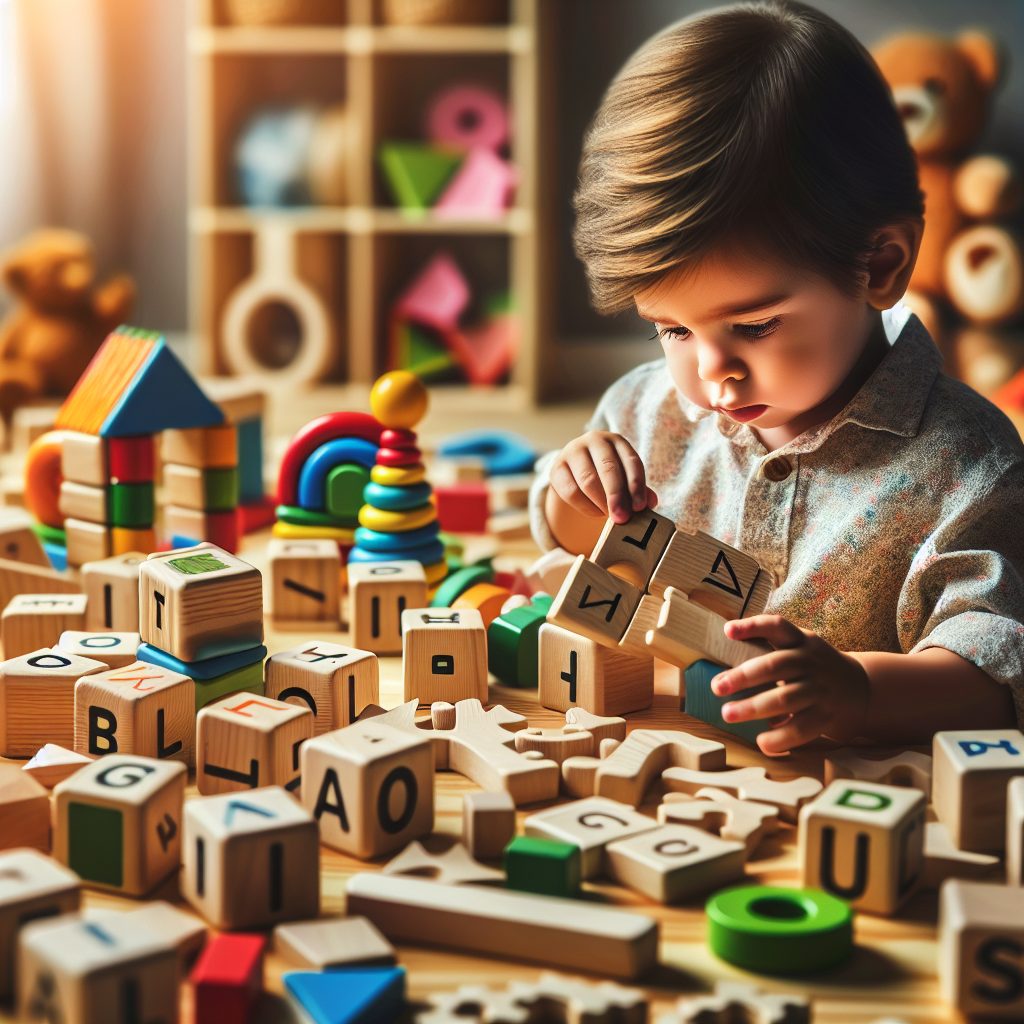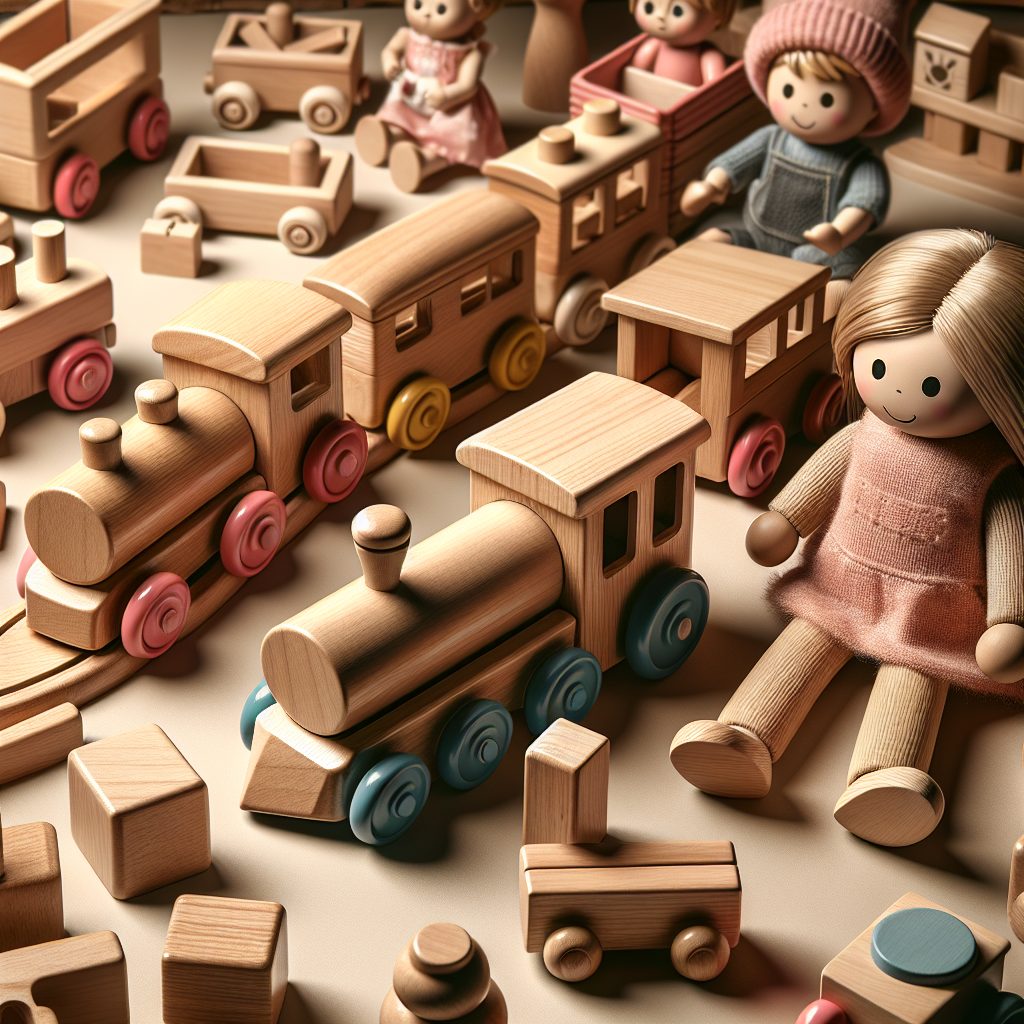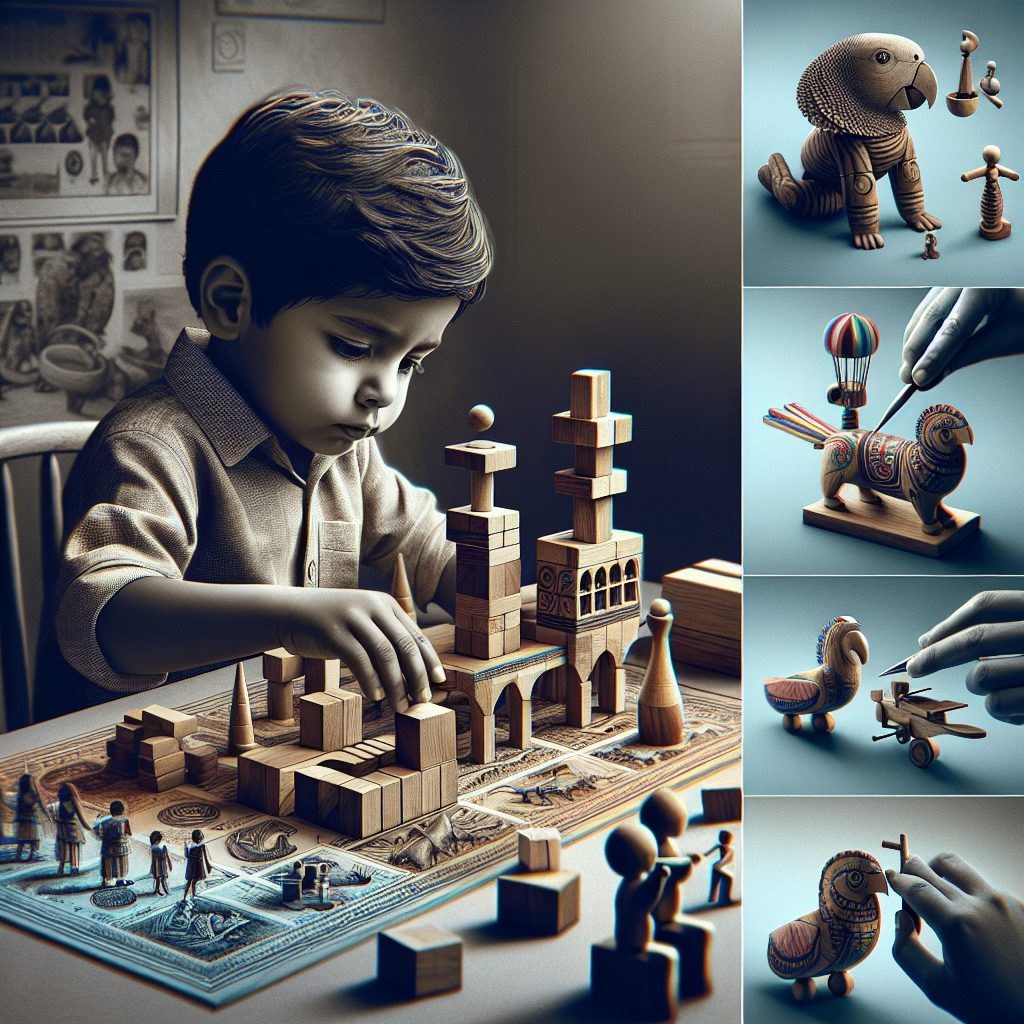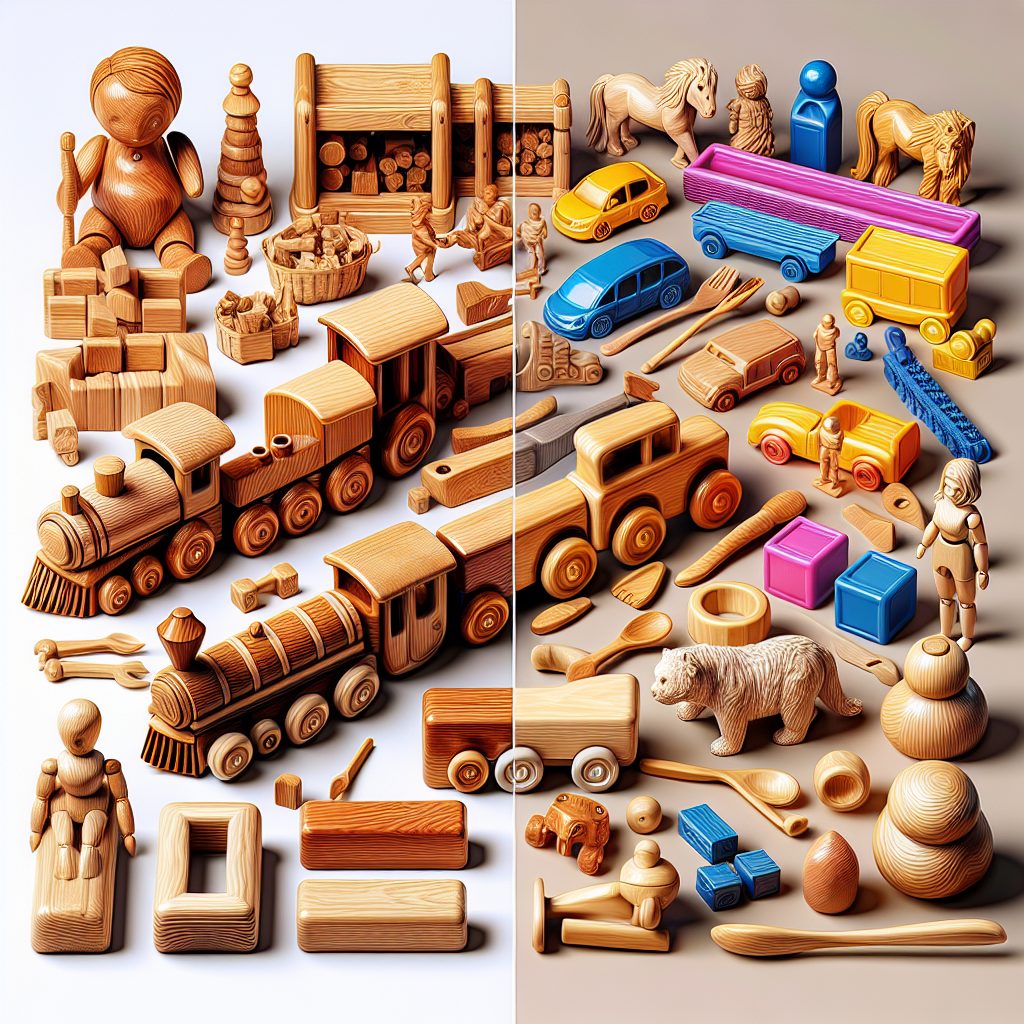Wooden toys have been a staple in children’s playrooms for generations, offering a timeless charm and durability that modern plastic toys often lack. These toys are not only […]
Popular Posts
Trending Posts
How Do Wooden Toys Help Children Learn
Why Wooden Toys Make The Best Playthings
Which Is Better Wooden Or Plastic Toys
Why Wooden Toys Make The Best Playthings
Wooden toys have been a staple in children’s playrooms for centuries, dating back to ancient civilizations like the Egyptians and Greeks. These toys are not only timeless and […]
What Are The Benefits Of Playing With Wooden Toys
Wooden toys have been a timeless favorite among children for generations. These classic playthings are not only aesthetically pleasing but also offer a range of benefits for young […]
Which Is Better Wooden Or Plastic Toys
When it comes to choosing toys for children, the debate between wooden and plastic toys has been a longstanding one in the parenting community. Wooden toys, often praised […]
Are There Any Social Benefits To Using Wooden Toys
Wooden toys have been a popular choice for children for generations, offering a timeless appeal that cannot be replicated by modern plastic toys. With their natural materials and […]
Are Wooden Toys Antibacterial
Wooden toys have long been a beloved choice for children due to their timeless appeal and durability. But one question that often arises is whether wooden toys have […]
How Do You Sanitize Wooden Blocks
Wooden blocks are a staple in many households, providing hours of entertainment for children while also helping to develop their cognitive and motor skills. However, with frequent use, […]
Why Are Wooden Toys Better For The Environment
Wooden toys have been making a comeback in recent years, and for good reason. Not only are they timeless and durable, but they also have a significantly lower […]
Do Wooden Toys Require More Maintenance Than Plastic Or Electronic Ones
Wooden toys have been a popular choice for children for generations, known for their durability and classic appeal. However, many parents may wonder if wooden toys require more […]
What Are The Cognitive Benefits Of Wooden Toys
Wooden toys have been a popular choice for children’s playthings for generations. These toys are not only durable and environmentally friendly, but they also offer a wide range […]
What Are The Physical Benefits Of Wooden Toys
When it comes to children’s toys, there is a growing trend towards choosing natural, eco-friendly options such as wooden toys. These toys are not only better for the […]
Are Wood Toys Good For The Environment
Wooden toys have been gaining popularity in recent years as more and more people become conscious of the environmental impact of plastic toys. These toys are often made […]
What Wood Are Montessori Toys Made Of
Montessori toys are an essential part of the Montessori method of education, which focuses on fostering independence and self-directed learning in children. These toys are carefully crafted to […]
What Are The Social Benefits Of Wooden Toys
Wooden toys have been beloved playthings for children for centuries, known for their timeless appeal and durability. These toys are typically made from natural materials such as wood, […]
Are There Any Cognitive Benefits To Using Wooden Toys
Wooden toys have been a beloved playtime option for children for centuries, often favored for their timeless charm and durability. In recent years, there has been a resurgence […]
What Is The Advantage Of Wooden Toys
Wooden toys have been treasured playthings for children for centuries, loved for their durability, timeless charm, and eco-friendly properties. Crafted from natural materials such as wood, these toys […]
What Are The Developmental Benefits Of Wooden Toys
Wooden toys have been a staple in children’s playrooms for generations, and for good reason. Not only are they durable and timeless, but they also offer a wide […]
What Are The Advantages Of Wooden Toys Over Plastic Toys
Wooden toys have been making a comeback in recent years as parents become more aware of the advantages they offer over their plastic counterparts. Not only are they […]
What Are The Educational Benefits Of Wooden Toys
Wooden toys have been a popular choice for children’s playtime for centuries, and for good reason. They offer a unique sensory experience that plastic or electronic toys simply […]
How Do You Sterilize Wooden Toys
Wooden toys have been a popular choice for parents seeking environmentally friendly and non-toxic options for their children. These toys are often made from natural materials such as […]
How Do You Disinfect Wooden Toy Blocks
Wooden toy blocks are a classic childhood toy that can provide hours of entertainment and learning opportunities for young children. However, with regular use, these wooden blocks can […]
What Ty Pes Of Creativity Can Be Fostered With Wooden Toys
Wooden toys have been a timeless favorite among children for generations, but their benefits extend far beyond simple entertainment. These toys are not only durable and eco-friendly, but […]
Are There Any Safety Concerns With Using Wooden Toys
Wooden toys have been a popular choice for children for generations, known for their durability and classic appeal. However, as parents become more conscious about the safety of […]
How Wooden Toys Are Better Than Plastic Toys
Wooden toys have been preferred by many parents and educators over plastic toys due to their numerous benefits. Not only are wooden toys more durable and long-lasting, but […]
Why Do Montessori Use Wooden Toys
Montessori schools have long been known for their use of wooden toys in classrooms, a practice rooted in the teachings and philosophies of Maria Montessori herself. Wooden toys […]
How Do Wooden Toys Help Children Develop
Wooden toys have been popular among children for centuries, offering a traditional and timeless play experience. These toys are not only aesthetically pleasing but also provide numerous benefits […]
Why Are All Montessori Toys Wooden
Montessori toys are specifically designed to support the educational philosophy developed by Maria Montessori, which emphasizes hands-on learning and self-discovery. One key characteristic of Montessori toys is their […]
How Do Wooden Toys Help Children Think
Wooden toys have been a beloved plaything for children for centuries, offering both entertainment and educational benefits. The natural texture and warmth of wood provide a sensory experience […]
How Do Wooden Toys Help Children Move
Wooden toys have been a popular choice for children’s playthings for generations, offering a timeless appeal and durability that modern counterparts often lack. These toys are not only […]
How Do You Sanitize Wood
When it comes to keeping our homes clean and hygienic, one common question that arises is: How do you sanitize wood? Wood surfaces can be a breeding ground […]
What Is The Process Of Making Wooden Toys
Wooden toys have been a beloved and timeless plaything for children for centuries. The process of creating these whimsical and sturdy toys involves a meticulous craftsmanship that sets […]
Why Are Plastic Toys Not Montessori
Plastic toys have become synonymous with modern childhood, but they lack the essential qualities that make them suitable for the Montessori method of education. In the Montessori approach, […]
What Ty Pes Of Knowledge Can Be Acquired With Wooden Toys
Wooden toys have been used for centuries as a tool for learning and development in children. The unique tactile experience and sensory stimulation provided by wooden toys allows […]
Are Wooden Toys Safer
Wooden toys have been a popular choice for parents seeking safer alternatives to plastic toys. The natural materials used in wooden toys are often non-toxic and free from […]
Are Wooden Toys Biodegradable
Wooden toys have been a popular choice for children for centuries due to their durability, timeless appeal, and eco-friendly nature. These toys are typically made from natural materials […]
Are There Any Environmental Benefits To Using Wooden Toys
Wooden toys have been a popular choice for parents and children for centuries, thanks to their durability, timeless appeal, and eco-friendly nature. Unlike plastic toys that are often […]
Is Unfinished Wood Safe For Babies
Unfinished wood refers to wood that has not been treated with any type of finish, such as paint, stain, or varnish. This type of wood is often chosen […]
How Long Do Wooden Toys Last Compared To Plastic Or Electronic Ones
Wooden toys have been around for centuries, providing children with a classic and durable playtime experience. Unlike their plastic or electronic counterparts, wooden toys are known for their […]
Are Wooden Toys Better For Toddlers
Wooden toys have been a popular choice for parents and caregivers when it comes to selecting toys for toddlers. These toys are typically made from natural materials such […]
What Is The Benefit Of Wooden Toys
Wooden toys have been around for centuries, offering children a more traditional and eco-friendly alternative to plastic toys. These timeless playthings are typically made from natural materials such […]
Are There Any Health Benefits To Using Wooden Toys
Wooden toys have been cherished by children for centuries, offering a timeless charm and durability that plastic toys often lack. The use of natural materials such as wood […]
Why Are Wooden Toys Better For Development
Wooden toys have been a popular choice for children’s playtime for generations, and for good reason. Not only are they durable and long-lasting, but they also offer numerous […]
What Ty Pes Of Social Skills Can Be Strengthened With Wooden Toys
When it comes to childhood development, social skills play a crucial role in setting the stage for future success. Wooden toys have long been praised for their ability […]
What Is The Benefit Of Wood Toys
Wood toys have been a timeless and classic choice for children, offering a multitude of benefits that set them apart from other materials. The natural texture and durability […]
What Ty Pes Of Motor Skills Can Be Improved With Wooden Toys
Motor skills development in children is a crucial aspect of their growth and learning process. Wooden toys have been known to play a significant role in enhancing various […]
What Are The Sensory Benefits Of Wooden Toys
Wooden toys have been a popular choice for parents and caregivers for many years due to their numerous sensory benefits. The term “sensory benefits” refers to the positive […]
How Do Wooden Toys Help Children Interact With Others
Wooden toys have long been cherished for their timeless appeal and durability. They offer a tactile and sensory experience that is unmatched by their plastic counterparts. Wooden toys […]
Are Plastic Or Wood Toys Better
When it comes to choosing toys for children, one common debate that often arises is whether plastic or wood toys are better. Plastic toys are typically more affordable […]
Are Wooden Toys Safe
When it comes to choosing toys for children, safety is always a top priority for parents. Wooden toys have long been a popular choice due to their durability, […]
Are Wood Toys Sanitary
Wood toys have long been a popular choice for parents seeking durable and eco-friendly alternatives to plastic toys. One of the key factors that make wood toys so […]
What Are Wooden Toys Made Of
Wooden toys have been a popular choice for children for centuries, known for their durability, safety, and eco-friendly qualities. These toys are typically made from natural materials such […]
What Are The Benefits Of Using Wooden Toys
Wooden toys have been a popular choice for children for centuries due to their durability and timeless appeal. Unlike plastic toys, wooden toys are often made from sustainable […]
Are There Any Physical Benefits To Using Wooden Toys
Wooden toys have been a popular choice for children for centuries, known for their durability, safety, and eco-friendly nature. Unlike plastic toys, wooden toys are typically made from […]
What Is The Purpose Of Wooden Toys
Wooden toys have been a beloved plaything for children for centuries, offering a timeless and classic form of entertainment. The purpose of wooden toys goes beyond just providing […]
Are There Any Developmental Benefits To Using Wooden Toys
Wooden toys have been a staple in children’s playrooms for generations, with their timeless appeal and durability. These classic toys are not only aesthetically pleasing, but they also […]
Why Wooden Toys Are Better For Kids
When it comes to choosing toys for children, many parents are increasingly turning to wooden toys as a better alternative. Wooden toys are made from natural materials such […]
How Do Toys Encourage A Child S Development
Toys play a crucial role in the development of a child, serving as tools that not only entertain but also educate and promote various aspects of growth. From […]
Are There Any Sensory Benefits To Using Wooden Toys
Wooden toys have been a staple in children’s playrooms for generations, known for their timeless appeal and durability. These toys are made from natural materials, providing a sensory […]
What Are The Benefits Of Wooden Toys
Wooden toys have been a beloved playtime staple for centuries, cherished for their durability, safety, and timeless appeal. With their natural materials and timeless design, wooden toys offer […]
Do Wooden Toys Need To Be Treated Or Sealed In Any Way For Safety Reasons
Wooden toys have been a timeless favorite for children of all ages, offering a classic and eco-friendly alternative to plastic gadgets. However, some parents may wonder if wooden […]
Are There Any Economic Benefits To Using Wooden Toys
Wooden toys have been a popular choice for parents and caregivers for generations. Not only do they offer a sense of nostalgia and classic charm, but there are […]
What Ty Pes Of Language Skills Can Be Enhanced With Wooden Toys
Wooden toys have been used for centuries as a means of entertainment and education for children. These timeless playthings offer a range of benefits beyond just fun and […]
How Are Wooden Toys Eco Friendly
Wooden toys have been gaining popularity in recent years due to their eco-friendly nature. Unlike plastic toys that are often made from non-biodegradable materials, wooden toys are typically […]
Why Are Wooden Toys Better
Wooden toys have been a popular choice among parents for generations, and for good reason. Not only are they durable and timeless, but they also offer a range […]



